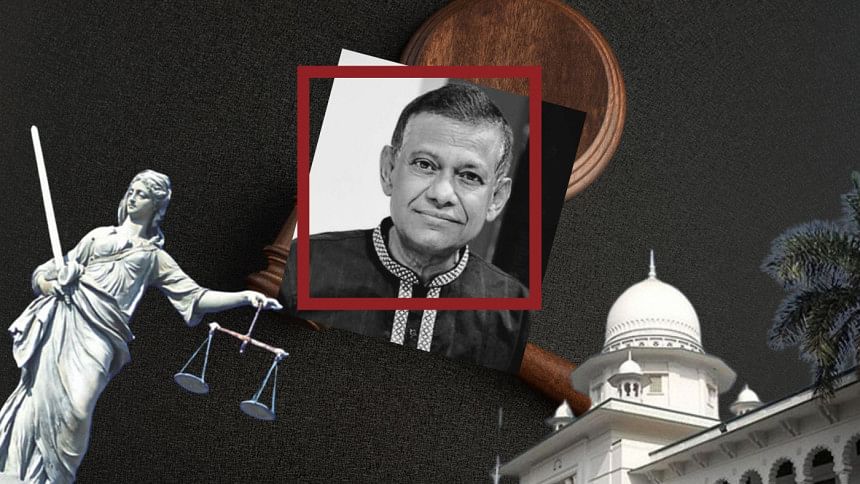
The recent arrest of AHM Shamsuddin Choudhury Manik, a retired judge of the Appellate Division of the Supreme Court in Bangladesh, has ignited a significant debate about the rule of law, constitutional adherence, and the overall integrity of the judiciary in Bangladesh. This arrest is not merely a personal predicament for the former judge but raises broader issues that have far-reaching consequences for the legal and political landscape of Bangladesh.
AHM Shamsuddin Choudhury Manik has long been a contentious figure, both during his tenure as a judge and in his post-retirement activities. His public behaviour, often viewed as politically biased, and his vocal presence in the media has raised doubts about the impartiality of the judiciary in Bangladesh. His involvement in several high-profile cases, which many believe were skewed in favour of the then ruling party, has further damaged the judiciary’s credibility.
The controversy surrounding Manik goes beyond his behaviour in and out of court. The circumstances of his appointment as a judge are equally problematic. Manik, who had a dual citizenship at the time, was appointed to the High Court Division in 2001 and later promoted to the Appellate Division in 2012 by Sheikh Hasina’s government. The decision to appoint Manik was widely criticised and seen by many as a political manoeuvre to ensure a compliant judiciary that would align with the government’s agenda.
Appointing a person with foreign nationality to the judiciary undermines the sovereignty and integrity of the legal system. It raises questions about the motivations behind such a decision, suggesting that judicial appointments were influenced more by political loyalty than by merit or adherence to the rule of law. This type of practice weakens the judiciary’s role as an independent check on executive power, essential in a functioning democracy, and sets a dangerous precedent for future administrations.
Several factors likely influenced the decision to appoint Manik. The ruling party might have seen Manik as a loyalist who would provide favourable rulings to support its interests, thereby securing its legislative and executive actions from judicial challenges. It could have also allowed it to consolidate control over the judiciary and minimise the risk of adverse legal decisions. Finally, by installing a judge known for his partisan views and criticism of political opponents, the government could have aimed to supress dissent and weaken opposition forces.
The appointment of a person with foreign nationality and his subsequent arrest highlights a troubling trend of judicial interference and manipulation. This undermines the independence of the judiciary and weakens the system of checks and balances that is fundamental to democratic governance. The perception that the judiciary is compromised and lacks independence diminishes public trust in the legal system. When citizens view the judiciary as a tool of the ruling party rather than an impartial arbiter of justice, it leads to decreased respect for court rulings and a broader sense of disillusionment with the rule of law. The actions taken by the Sheikh Hasina government set a concerning precedent that future administrations might follow. If judicial appointments continue to be politicised, it could become increasingly difficult to restore judicial independence and uphold the rule of law.
The arrest of AHM Shamsuddin Choudhury Manik and the controversies surrounding his past actions provide several critical lessons. Firstly, all branches of the government must strictly adhere to constitutional provisions. Violating these principles undermines democratic norms and can lead to authoritarianism. Judicial appointments should be based on merit and integrity, not political loyalty. Governments must be held accountable for actions that undermine democratic institutions. Civil society, the media, and international organisations must play a vital role in promoting transparency and accountability in governance. To prevent future abuses, it is crucial to establish a transparent and rigorous process for judicial appointments, involving multiple stakeholders, including the judiciary, legal professionals, and civil society.
As Bangladesh navigates this challenging period, it must take decisive steps to restore public confidence in its institutions and reaffirm its commitment to the rule of law. The future of Bangladesh’s democracy depends on its ability to learn from these events and implement reforms that safeguard its constitutional principles and democratic values.
Dr Serajul I Bhuiyan is professor and former chair at the Department of Journalism and Mass Communications at Savannah State University in Savannah, Georgia in the US and former president of Business and Applied Sciences Academy of North America (BAASANA).
Daily Star









